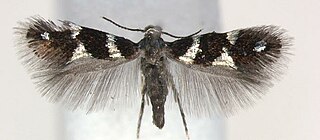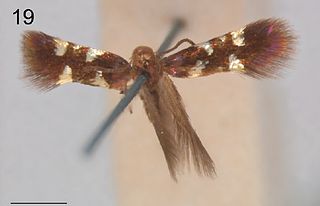
The Heliozelidae, commonly known as shield-bearer moths, are a family of small, day flying monotrysian moths distributed worldwide. The larvae of most heliozelid species are leaf miners who cut distinctive shield-shaped cases from the surface of the host leaf, hence the common name. Some species are considered pests of commercial crops such as grapevines, cranberries, and walnuts. The taxonomy of this family is poorly understood.

Antispila nysaefoliella is a species of moth of the family Heliozelidae. It is found in south-eastern North America.

Antispila metallella is a moth of the family Heliozelidae. It is found from Scandinavia to the Pyrenees, Alps and Romania and from Great Britain to Russia.

Antispila isabella is a species of moth of the family Heliozelidae. It is found in Ontario, Connecticut, Georgia, Kentucky, New York, Pennsylvania and Vermont. However, research concludes that a complex of species is involved under this name.
Antispila ampelopsia is a moth of the family Heliozelidae. It was described by Kuroko in 1961. It is found in Japan.

Antispila argostoma is a moth of the family Heliozelidae. It was described by Edward Meyrick in 1916. It is found in India.
Antispila orbiculella is a moth of the family Heliozelidae. It was described by Kuroko in 1961. It is found in Japan.
Antispila corniella is a moth of the family Heliozelidae. It was described by Kuroko in 1961. It is found in Japan (Kyushu).
Antispila hikosana is a moth of the family Heliozelidae. It was described by Kuroko in 1961. It is found in Japan (Kyushu).
Antispila hydrangifoliella is a moth of the family Heliozelidae. It was described by Kuroko in 1961. It is found in Japan (Kyushu).
Antispila purplella is a moth of the family Heliozelidae. It was described by Kuroko in 1961. It is found in Japan (Kyushu).

Antispila aristarcha is a moth of the family Heliozelidae. It was described by Edward Meyrick in 1916. It is found in India.
Antispila cleyerella is a moth of the family Heliozelidae that is endemic to Japan.
Antispila distyliella is a moth of the family Heliozelidae. It is found on the Ryukyu Islands in Japan.
Antispila inouei is a moth of the family Heliozelidae. It was described by Kuroko in 1987. It is found in Japan.
Antispila isorrhythma is a moth of the family Heliozelidae. It was described by Edward Meyrick in 1926. It is found in India.
Antispila tateshinensis is a moth of the family Heliozelidae. It was described by Kuroko in 1987. It is found in Japan.
Antispila uenoi is a moth of the family Heliozelidae. It was described by Kuroko in 1987. It is found in Japan. In 2018, the species was found from China.
Heliozela limbata is a moth of the family Heliozelidae. It was described by Lee, Hirowatari and Kuroko in 2006 and is endemic to Japan.

Aspilanta viticordifoliella is a species of moth in the family Heliozelidae. It is found in eastern North America. The larvae are leaf miners that feed on Virginia creeper, false Virginia creeper, and frost grape.





